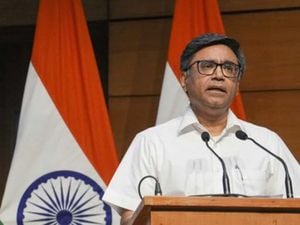On May 6, 2025, the world watched as tensions escalated once more between the nuclear powers of India and Pakistan. The Indian military launched a series of targeted strikes in a covert operation dubbed "Operation Sindoor," which reportedly hit nine locations within Pakistani territory and Pakistan-administered Kashmir. This dramatic escalation came just days after a terrorist attack in Kashmir claimed the lives of 26 Indian tourists, marking one of the most severe incidents of violence on Indian soil since the 2008 Mumbai attacks, which resulted in 166 fatalities.
In response to the strikes, Pakistan's government condemned India as a "cowardly enemy" that initiated an unprovoked attack. Pakistani Prime Minister Shehbaz Sharif convened a national security council meeting immediately, asserting that they had already shot down at least two Indian aircraft in retaliation. The backdrop to this renewed conflict is a long history of animosity that stretches back over 77 years, originating from the partition of British India in 1947, which was marred by the Kashmir dispute.
Kashmir, a region claimed by both India and Pakistan, has been the focal point of numerous military confrontations. The original princely ruler of Kashmir sought independence from both nations but ultimately decided to join India in exchange for military assistance against Pakistani invaders. This led to the first Indo-Pakistani war from 1947 to 1948 and the subsequent Karachi Agreement in 1949, which established a ceasefire line. However, this was merely the beginning of an ongoing cycle of conflict.
Subsequent wars in 1965 and 1971, along with India's nuclear tests in 1974 and Pakistan's development of its nuclear arsenal in the 1990s, have only intensified the hostilities. The Kashmir region has seen numerous violent outbreaks, including the Kargil War in 1999 and the infamous Mumbai attacks in 2008, where the militant group Lashkar-e-Taiba (LeT), allegedly linked to Pakistan's intelligence agency (ISI), was implicated.
In recent years, the Indian government, under Prime Minister Narendra Modi, has adopted a more aggressive stance, particularly following the revocation of Article 370 in 2019, which stripped Kashmir of its special status. This decision has led to widespread unrest among Kashmiris, who feel they have lost their identity, and it has sparked significant protests and civil unrest.
The violence has persisted into 2022 and 2023, with incidents including the targeted killings of Hindus by extremist groups and attacks on tourists. A shocking event in 2024 saw a bus carrying pilgrims attacked, resulting in nine deaths, while a construction site shooting in October left seven workers dead. The situation reached a boiling point again on April 22, 2025, when another attack on tourists resulted in 25 Indian and one Nepalese casualty. India has accused Pakistan of providing safe haven to terrorists and has detained two Pakistani suspects.
In a dramatic escalation, Pakistan has claimed that these attacks may have been "false flag" operations orchestrated by India to justify military action. The group "Kashmir Resistance," a faction of LeT, has taken responsibility for the attack, further complicating the narrative.
As hostilities have intensified, India has suspended the Indus Water Treaty, closed border crossings, and revoked special visas, while Pakistan has retaliated by closing its airspace, halting trade, and canceling special visa arrangements. Analysts are increasingly concerned that both nations may be on the brink of a major military conflict, particularly given their nuclear capabilities.
Internationally, calls for restraint have come from various quarters, including the United Nations, China, and the United States, all urging both nations to exercise maximum restraint. However, the ongoing clashes along the Kashmir border, coupled with military operations and significant arrests in the region, suggest that the situation remains precarious.
The India-Pakistan conflict is not merely a regional issue; it has the potential to become a global flashpoint. The world must closely monitor the situation, as any miscalculation could lead to a significant escalation of military hostilities, with dire consequences for the stability of South Asia and global security.
As the conflict continues to unfold, the Civil Aviation Authority of Thailand (CAAT) has issued advisories to airlines regarding flight routes, urging them to avoid conflict zones. This is part of a broader response to the heightened tensions, as several airlines have already altered their flight paths to circumvent Pakistani airspace, which has been deemed unsafe.
CAAT has recommended that passengers, especially those with urgent travel needs, remain vigilant and stay in close contact with their airlines for the latest updates on potential disruptions. They also emphasize the importance of understanding passenger rights under existing regulations to ensure proper protection during these turbulent times.
In summary, the ongoing conflict between India and Pakistan is a complex issue rooted in historical grievances and national identities. With both nations armed with nuclear weapons, the stakes have never been higher. As the situation develops, the international community must remain engaged in seeking a peaceful resolution to avoid a catastrophic outcome.




